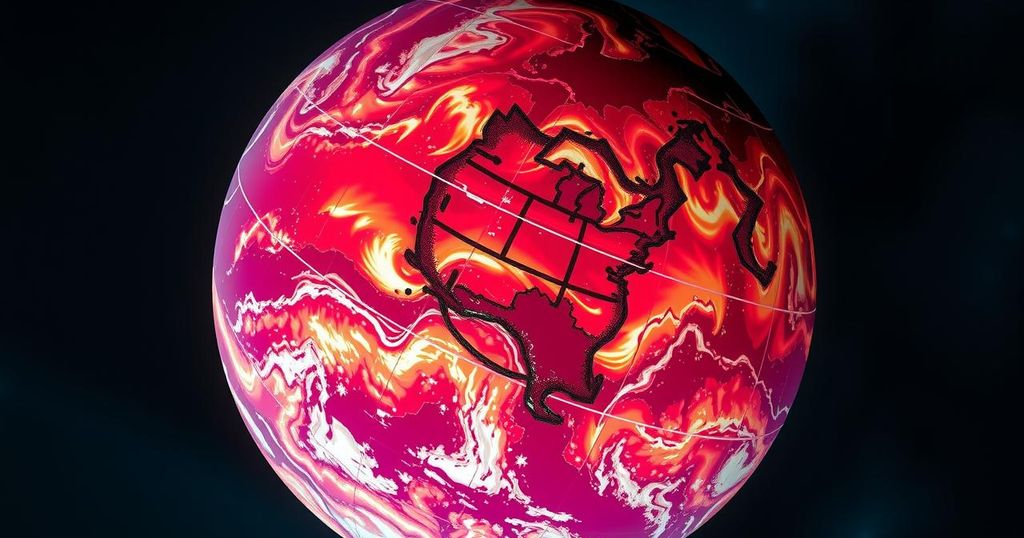2024: A Record-Breaking Year of Climate Extremes and Urgent Action Needed

2024 has been confirmed as the hottest year on record, driven by greenhouse gas emissions and leading to severe weather events worldwide. Significant rises in sea surface temperatures and water vapor levels have resulted in catastrophic storms and flooding. Experts highlight an urgent need for action to combat climate change and mitigate its intensifying impact.
Recent confirmations from climate science agencies in the United States, United Kingdom, Europe, and Japan have revealed that 2024 is recorded as Earth’s hottest year yet. The rising temperatures are attributed predominantly to greenhouse gas emissions, which have exacerbated global warming and intensified severe weather phenomena. The Copernicus Climate Change Service reported astonishing increases in sea surface temperatures and atmospheric water vapor, leading to damaging storms and flooding across various regions. Samantha Burgess, deputy director at C3S, emphasized the dire consequences of these climate extremes, impacting millions worldwide.
Director of NASA’s Goddard Institute for Space Studies, Gavin Schmidt, noted that the correlation between climate change and extreme weather patterns is becoming increasingly evident. He asserted that unprecedented heat waves and heightened rainfall would largely not have occurred without anthropogenic warming. Moreover, he referenced significant events of 2024, including Hurricane Helene, which resulted in the loss of over 230 lives across seven states, early heat waves in Mexico, and pronounced droughts in South America affecting the Amazon River.
The contributory elements to the rampant warming trends include the El Niño phenomenon and decreased global cloud cover; nevertheless, greenhouse gas accumulation remains the principal driving force behind climate extremes. Schmidt indicated that global temperatures are destined to rise as long as greenhouse gas emissions persist at current levels. Notably, the last decade has recorded each year among the ten warmest, with 2023 briefly surpassing the critical threshold of 1.5 degrees Celsius above preindustrial levels.
According to Burgess, the average temperature of the prior two years exceeds this essential mark, putting the global temperature trajectory in jeopardy. Although the U.S. agencies have indicated warming close to but slightly below the 1.5 degrees Celsius threshold, scientists reiterated that the Paris Agreement aims to offset dangerous climate impacts associated with progressive warming levels.
Michael E. Mann, a leading climate scientist, contended that at existing carbon emission rates, the 1.5 degrees Celsius target could be breached within the next decade. He called for immediate action to curb future warming and greenhouse gas emissions, stressing that limiting every fraction of a degree is imperative in mitigating climate change’s adverse effects. Furthermore, as extreme weather disasters continue to unfold, such as catastrophic wildfires in Southern California, the urgency for comprehensive climate action grows immensely.
The context of this report is rooted in the ongoing climate crisis, characterized by rising average global temperatures attributed to human activities, primarily fossil fuel combustion. The data gathered by multiple international climate agencies indicates an alarming trend of increasing temperatures and extreme weather events as greenhouse gas emissions reach unprecedented levels. This article outlines how extreme weather events in 2024, such as hurricanes and droughts, connect to larger patterns of climate change, underscored by the expectations laid out in the Paris Climate Agreement.
In conclusion, 2024 has marked a pivotal moment in documenting climate change, being acknowledged as the hottest year to date due to continued greenhouse gas emissions and their impact on global temperatures. The direct correlation between human activity and the climate crisis grows clearer as extreme events increasingly manifest. Immediate measures aimed at reducing emissions are imperative to curtail further warming and alleviate the severe repercussions that have already begun to affect millions globally.
Original Source: www.newsweek.com





